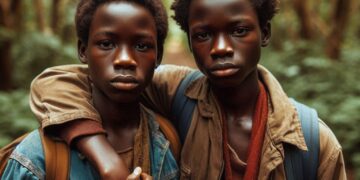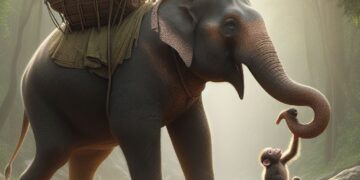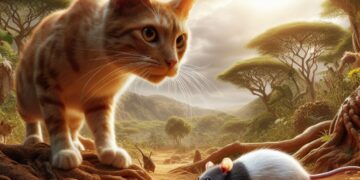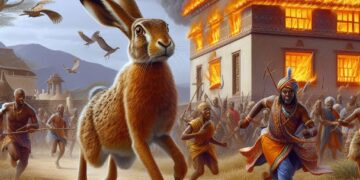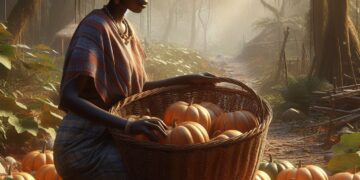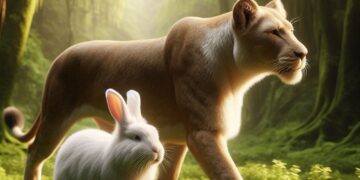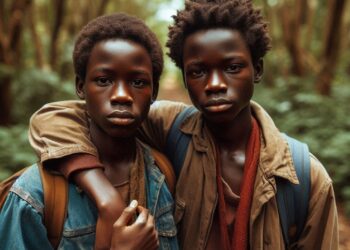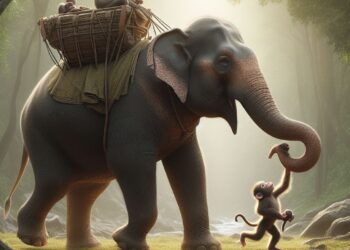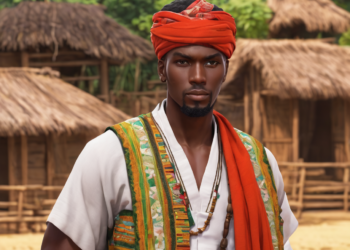In the heart of the vibrant Mabira Forest, where the whispers of ancient trees blended with the rustling sounds of hidden creatures, an extraordinary friendship blossomed between Jumbo, the wise and colossal grey elephant, and Hoppington, a hare with a heart as mischievous as his hops.
One fine day, the dynamic duo decided to embark on an ambitious venture – a wheat farm on the hare’s patch of land. The idea of such an unusual partnership sent ripples through the jungle, but the excitement was palpable. With the sun casting its golden rays, the two friends began their agricultural escapade.
Jumbo, with his colossal strength, took charge of the Herculean tasks. His trunk swayed majestically as he cleared the land, plowed it with tusks that could rival ancient mammoths, and shattered big lumps of earth with thunderous stomps. Meanwhile, Hoppington, with his nimble paws, was entrusted with the seemingly straightforward task of sowing the seeds. Little did Jumbo know that his friend had more tricks up his furry sleeve than a magician at a royal court.
As the days turned into weeks, it became evident that the hare’s enthusiasm exceeded his farming skills. Seeing an opportunity, Hoppington proposed a division of labor – he would handle the weeding and harvesting. The unsuspecting elephant, ever the gentle giant, agreed with a jovial shake of his mighty head.
Come harvest time, Hoppington was struck down with a sudden fever, conveniently rendering him incapable of contributing to the final leg of their farming venture. The clever hare, however, saw this as an opportunity rather than a setback. Convincing Jumbo that he deserved a share of the profits despite his minimal contribution, Hoppington set his sights on a grander adventure – a journey to the capital to make his fortune.
His path, however, was paved with peculiar encounters that could rival the most absurd of tales. The first challenge came in the form of a hungry guinea-fowl, whose appetite proved mightier than the hare’s cunning. The corn meant for trade disappeared in a swift gulp, leaving Hoppington flustered.
Undeterred, the hare ventured further, encountering a group of men hurling stones at wild plums. In a moment of misfortune, an egg was substituted for a stone, leaving Hoppington with a broken dream and a broken egg. Seizing the opportunity, he spun a tale of woe, drawing sympathy from the men who gifted him their plums in exchange for the imaginary mishap.
Next on his journey was a boastful hornbill, perched on a cedar branch, cawing louder than a thunderstorm. The hare, uninterested in the bird’s tales of a once-exquisite voice, negotiated for two of the hornbill’s black-and-white tail feathers.
Yet, fate, as capricious as ever, had other plans. While admiring his newfound feathers by the riverbank, they slipped from Hoppington’s grasp, disappearing into the current. Distraught, the hare pleaded with the Fairy of the River for their return. The wise Fairy, hidden deep below the surface, offered a piece of advice akin to life’s inevitable currents – take some pure water and trade with that.
Armed with river water, the hare journeyed on, stumbling upon a group of blacksmiths idly sitting under a tree. Their lack of water for the forge became Hoppington’s chance to shine. The water from his bottle flowed into the blacksmiths’ hands, and in return, a gleaming axe found its way into the hare’s possession.
With an axe in hand, Hoppington reached a market where a butcher, facing a dilemma with a broken knife, yearned for a solution. The hare, sensing an opportunity, traded his axe for the butcher’s cow head, envisioning grandeur in the most unexpected of prizes.
The final leg of Hoppington’s journey brought him to a picturesque marsh along a mighty river, where herds of cattle roamed freely. The hare, fatigued from dragging the heavy cow head, concocted a cunning plan. He positioned the head between reeds, creating a spectacle that would rival the grandest dramas.
Summoning the herdsmen with desperate cries, Hoppington spun a tale of the big grey elephant’s drowning cow. The herdsmen, compassionate but cautious, devised a plan for the hare to tie a rope to the cow’s horns, allowing them to pull it to safety.
In a comedic turn of events, the cow head jerked out of the marsh with a theatrical flourish, leaving the herdsmen in stitches. Unbeknownst to them, it was a hare’s ruse, a grand performance orchestrated to win their favor.
“See what you have done!” exclaimed Hoppington with mock dismay. “You have pulled the head off the big grey elephant’s cow.” The herdsmen, realizing the trick, burst into laughter. Far from being angered, they invited Hoppington to stay the night in their kraals, exchanging stories of jungle antics and forest adventures.
The next morning, true to their word, the herdsmen presented the hare with a magnificent white cow with long horns. Hoppington, now a legend in the Mabira Forest, returned home driving his newfound wealth before him.
Jumbo, the big grey elephant, greeted his friend with a mixture of astonishment and admiration. The tale of their unconventional farming escapade became a cherished legend in the jungle, passed down through generations. And so, the big grey elephant and the clever hare continued their adventures, sharing laughter, stories, and the occasional farming mishap, forever entwined in the colorful tapestry of the Mabira Forest.

